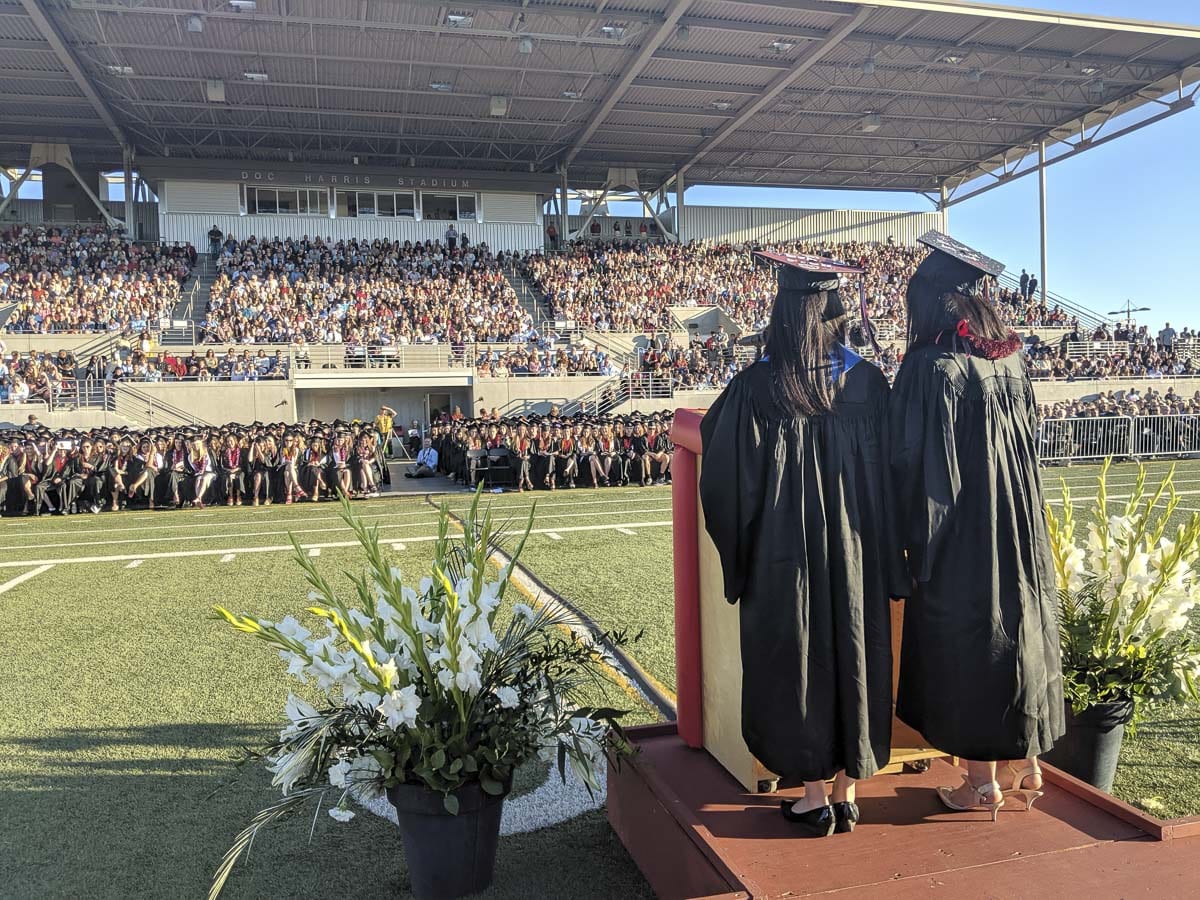School district’s goal is to talk to every graduate, every year
CAMAS — They ask, and just as important, they listen.
Notes are taken from every discussion. Themes are realized and entered into a database. The superintendent goes into a deep dive with all of that information.

“We want to gather feedback on what worked and what didn’t work,” said Jeff Snell, the superintendent of the Camas School District.
The district wants to celebrate and reinforce all that it is doing right, and look for areas of improvement.
This is the fourth year of the senior exit interviews within the school district. The goal is to interview every graduate from Camas High School and Hayes Freedom High School — that is more than 500 this academic year. With scheduling conflicts, it can be a challenge to get to everyone, but Snell said most seniors did participate this month.
“Constructive feedback is not a negative for us in this process,” Snell said. “We just want to listen. When you have 500-plus seniors, each is going to have a unique perspective. We’re glad and proud that they graduated, and we take their feedback seriously.”
Snell asks for a number of teachers from elementary and middle schools to ask the questions. Seniors, three or four at a time, sit with teachers for the interview. The students are told that the teachers want their honest opinions.
Questions are not just based on the high school experience. The district wants to know when each student first started attending Camas schools. Was it from kindergarten, or did a student move to Camas in middle school, for example?
Other questions include:
• What stands out about high school?
• What should Camas keep doing that supports students? What should Camas stop doing?
• What should Camas start doing?
• What advice would you give to an incoming high school student?
This reporter was invited to sit in on one of the exit interviews. Three were critical of what they believe was a lack of support for minority students. They also were concerned for the mental health of students, with so much emphasis on advanced placement courses and the pressure to perform.
One, when asked to give advice to an incoming high school student, was brutally honest.
“Don’t come here.”
Snell said that was out of the ordinary. Most students, he said, report a positive experience from their time in the district. Still, criticism will help make Camas better in the future, he said.
“Our goal is to make sure everyone is heard,” Snell said. “If you ask people, you have to be willing to listen.”
Over the weekend, Snell sent an email to all staff, detailing the themes from this year’s exit interviews. He included some quotes from students.
The student-teacher relationship:
“When they care, I care,” one student said.
“What you need to keep doing is getting to know your students,” another student said. “We aren’t just a number. We are people.”
Communication:
“It really helped me when teachers regularly communicated to me about how I was doing.”
Social emotional/mental health:
“The adults act like students can’t make a mistake because it will ruin the Camas image. Everything is done over the top and has to be perfect,” one noted.
But another said: “This school is my saving grace.”
Quality of education:
“I had great teachers that really cared about me. It made a difference,” one said.
Other quotes of note:
“I actually liked the high expectations now that I think about it. It made me better.”
“There isn’t a textbook for the world, so learning about taxes and retirement would be really helpful.”
“Other people’s accomplishments are not your failures.”
…
Any teachers, from elementary, middle school or high school, who are given compliments during the exit interviews get an email from Snell.
“You were mentioned in a senior exit interview. Thank you for what you do,” Snell says to the teachers. “You’ve made an impact.”
He will even make contact with teachers from other school districts. This year, a student who moved from New Jersey had a positive experience with a teacher there. Snell found the teacher’s contact information and sent the teacher a thank you email.
This annual event at Camas started by accident, Snell said. When he was making the transition to superintendent, he asked a school counselor to find 30 or 40 random seniors to talk to about the district.
“The experience was so powerful, I started toying around the idea of how do we get more staff to experience this,” he said. “What would happen if we interviewed all seniors?”
Snell said he believes other districts have exit interviews, but he knows Camas’ system is extensive. Last week, representatives from Vashon Island School District were there to observe. The Camas plan has been shared in other districts around the Northwest, too.
At Camas, or at any district, Snell said the key is listening to the students. He said all people appreciate being asked to provide their opinion.
“I want to amplify student voice through this,” Snell said. “These themes aren’t themes we don’t know already. We know relationships are important. But if you hear it from a student voice, it’s particularly powerful.
“Our goal is to have our students’ voices in our heads as we’re planning activities, as we are supporting those learning experiences. If we have our students’ voices in our heads, then we’re going to deliver better.”




